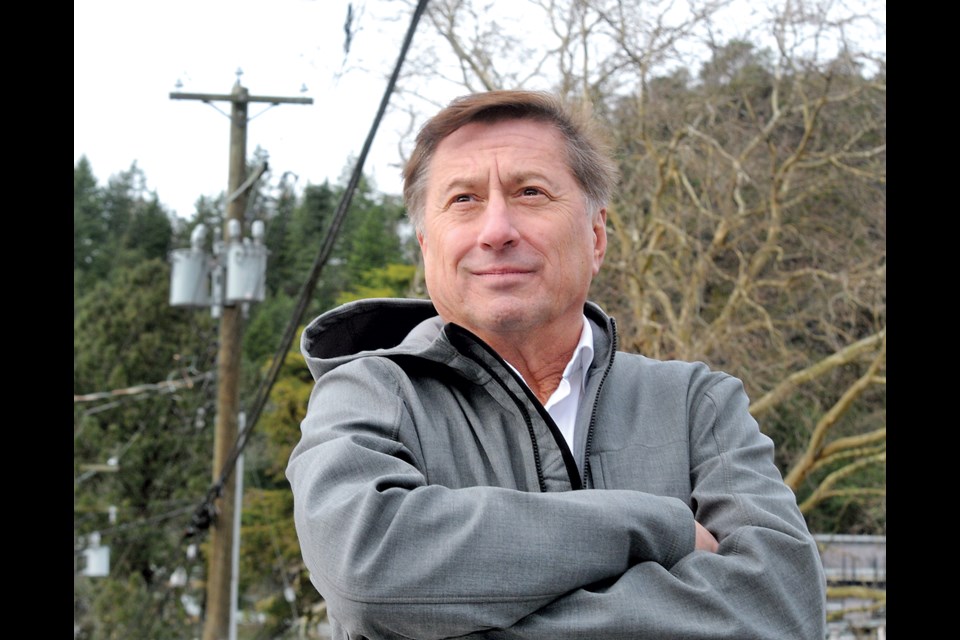Contrary to staff’s recommendation not to put Horseshoe Bay’s power lines underground – in large part due to its eye-watering price tag – West Vancouver council has decided to jump-start the project.
During a lively discussion on Monday, council voted unanimously to have staff engage utility companies for detailed designs to place power lines underground on Bay Street, the waterfront strip in the tourist-heavy neighbourhood.
The approved motion, put forward by Coun. Linda Watt, also directs staff to explore doing the work in phases, to review detailed streetscape designs for Bay Street and to fund related design costs through existing funds earmarked for the project.
Put simply: “The bottom line of Coun. Watt’s motion is to ask staff to proceed with finding a way to do this. And I think staff appreciate this as a priority for the council,” said Mayor Mark Sager.
In a January report, staff concluded that undergrounding the overhead utilities shouldn’t go ahead due to the high preliminary cost estimates and a “significant” risk of further cost increases resulting from complexities and uncertainties of the work.
When the Horseshoe Bay streetscape project first got underway in 2016, the scope included various esthetic and functional upgrades to the key commercial area as well as the undergrounding work. The initial budget was $5.6 million.
But in April 2022, staff determined that the undergrounding work would stop due to unforeseen costs.
“Staff reviewed this with council at the time in a closed meeting, and following this, the community was informed,” reads the January report.
To date, the district has spent more than $1.7 million on the streetscape work. Around $4.5 million in funding remains, mostly from community amenity contributions and some from developer cost charges.
What would it cost to see all this work to completion? Around $18.3 million, according to staff estimates, which leaves a deficit of $13.8 million. A loan of this amount could be paid for with a tax hike of 1.2 per cent over 30 years.
“It should be noted that there exists a significant amount of risk, complexity, and uncertainty with undergrounding projects, particularly those for brownfield land sites,” reads the report.
Several residents and members of the local business community spoke at the meeting, upset that the district hadn’t kept its word to put the power infrastructure out of sight.
Promises to bury power lines 'remain unfulfilled'
Burying the power lines underground was promised by council in 2020, said Chloe Kopman, who said she’s lived in Horseshoe Bay for 19 years.
“As a real estate professional … I conveyed this assurance to all my potential buyers, emphasizing the burial of the power lines on Bay Street and the last block of Royal Avenue,” she said. “Regrettably, the promises remain unfulfilled, leaving me to feel ashamed for publicizing inaccurate information.”
Apart from being not nice to look at, Kopman and others emphasized the added safety of undergrounding power lines and the reduction of power outages.
“It often feels like we’re a second class citizen in West Vancouver,” said Megan Sewell, whose family owns Sewell’s Marina. “And it’s been really nice to see the attention from all members of council on Horseshoe Bay recently.”
“Although the number seems really high today to underground the lines, I encourage new tools to be found to find the funding to deliver on that promise and move forward with the much-needed streetscape upgrades of Horseshoe Bay,” said Sewell, who is also president of the Horseshoe Bay Business Association.
Regarding the motion brought forth on Monday, Coun. Scott Snider asked what the cost of the new design work would be.
As stated in the staff report, the estimated cost for the detailed hydro design services is $450,000, said Jenn Moller, district director of engineering and transportation services. There would also be additional design fees associated with civil works for the streetscape, but “I don’t expect they would be anywhere close to the fees associated with the hydro design,” she said.
Snider also asked if the streetscape improvements could still go ahead with or without the undergrounding design work.
Mayor Sager addressed Snider directly. “I think most people who live in the Bay understand that, given the new official community plan for Horseshoe Bay, it is anticipated that there will be new development taking place,” he said. “I have spoken to the owners of some of those buildings and said to them: ‘Expect to be contributing to the cost of the undergrounding.'”
District should ask province for money, councillor says
Coun. Nora Gambioli asked staff to clarify where the $1.7 million has been spent so far. Muller replied that most had gone to the streetscape improvements, and some to the undergrounding infrastructure, on Royal Avenue.
Looking at other expenditures in the area, Gambioli noted that another $7.3 million had been spent on revitalizing Horseshoe Bay Park, a project that wrapped up in fall 2023.
Coun. Linda Watt responded to Gambioli: “So in the last three years we’ve invested $9 million in Horseshoe Bay, but what about all the years from 1986?”
“Until now, it’s actually a relatively low investment, when you look at the time period and the money that has gone into other parts of the municipality,” she said.
Building the ferry terminal in Horseshoe Bay was a “tragedy,” said Coun. Christine Cassidy.
Doubting that the district would be able to come up with enough money for the project, Cassidy suggested asking the province for money “in assisting and beautifying something that they have succeeded in making look not so hot.”
“I would go after the province, since Mr. Eby is doing such wonders for us so far,” she said.




